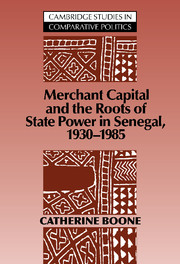Book contents
- Frontmatter
- Contents
- List of tables and figure
- Preface and acknowledgments
- Introduction
- 1 Capital and contingencies of postcolonial politics
- 2 The colonial market
- 3 Consolidation of a regime: Neocolonialism in the 1960s
- 4 Growth of Senegal's textile industry, 1960–1975
- 5 Reappropriation of the state: The 1970s
- 6 Demise of the Dakar textile industry
- Conclusion: States, capital, and capitalist states
- Appendix: Exchange rates
- References
- Index
Preface and acknowledgments
Published online by Cambridge University Press: 13 October 2009
- Frontmatter
- Contents
- List of tables and figure
- Preface and acknowledgments
- Introduction
- 1 Capital and contingencies of postcolonial politics
- 2 The colonial market
- 3 Consolidation of a regime: Neocolonialism in the 1960s
- 4 Growth of Senegal's textile industry, 1960–1975
- 5 Reappropriation of the state: The 1970s
- 6 Demise of the Dakar textile industry
- Conclusion: States, capital, and capitalist states
- Appendix: Exchange rates
- References
- Index
Summary
In the analysis of economies on the periphery of the world capitalist system, industry studies provide vehicles for testing and generating theories about changing patterns of capital accumulation at the local level, class formation, and the role of the state in shaping economic change. The present study was undertaken in this tradition.
I began studying the Dakar textile industry in 1984. This industry was the core of an “import-substitution” industrial sector implanted during the final decade of direct colonial rule. Like most of light industry in Dakar, it had been heavily protected from foreign competition since its birth in the 1950s. Senegal's foreign creditors were pushing free markets and economic liberalization in the 1980s, policies that would surely spell the demise of the industry. My project, as it was conceived when I set out in 1984, was to study the conflicts, compromises, and bargaining processes that would emerge as the “triple alliance” – the state, foreign capital, and local private capital – maneuvered in the face of external creditors' demands for reform.
I immediately ran up against two major facts about the Dakar textile industry in the 1980s. First, the World Bank's demands for liberalization of the import trade seemed to have had no discernible effect. On paper, the industry was more protected from foreign competition in 1984–6 than it had been in the past.
- Type
- Chapter
- Information
- Merchant Capital and the Roots of State Power in Senegal1930–1985, pp. xi - xviPublisher: Cambridge University PressPrint publication year: 1992



